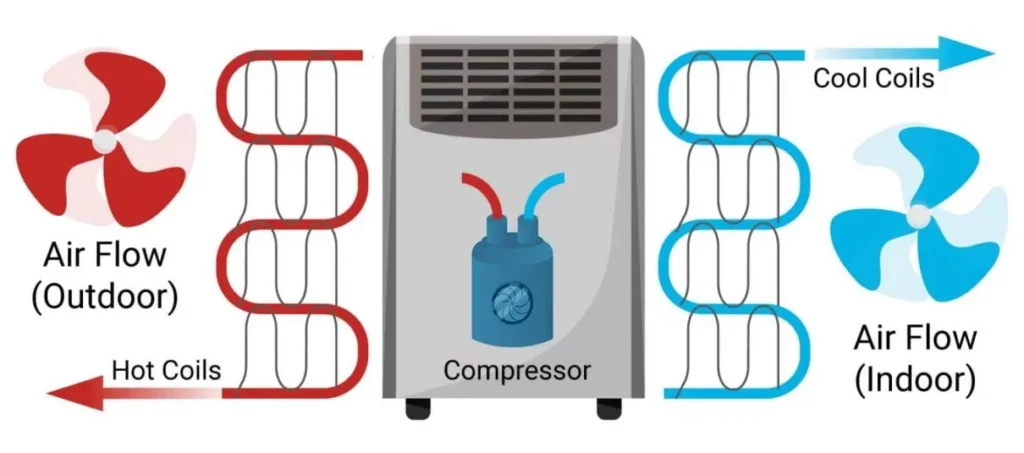Portable AC: The Ultimate Guide to Staying Cool Anywhere
1. Introduction
What is a Portable AC?
Portable air conditioners, commonly known as portable ACs, are versatile cooling units designed to provide relief from heat in various environments. Unlike traditional AC systems, which are fixed installations, portable AC units offer flexibility and convenience, allowing users to cool specific areas as needed.
2. Benefits of Portable AC Units
Convenience and Mobility
One of the primary advantages of portable AC units is their portability. Users can easily move them from room to room, making them ideal for apartments, offices, or any space where a permanent AC installation isn’t feasible. Additionally, portable ACs are relatively easy to install compared to window or central AC systems, requiring minimal setup time.
3. How Portable AC Works

Components and Mechanisms
Portable AC units operate on the same principles as traditional air conditioners, consisting of key components such as a compressor, condenser, evaporator, and refrigerant. These units draw in warm air from the room, extract heat through the refrigeration cycle, and expel cool air back into the environment.
4. Choosing the Right Portable AC
Size, BTUs, and Features
When selecting a portable AC unit, consider factors such as room size, British Thermal Units (BTUs), and additional features like programmable settings, remote control, and energy-saving modes. Choosing the right size and specifications ensures optimal cooling efficiency and performance.
5. Installation and Maintenance Tips
Setting Up and Cleaning
Proper installation and maintenance are crucial for maximizing the lifespan and efficiency of portable AC units. Follow manufacturer guidelines for setup, including venting requirements and electrical connections. Regular cleaning of filters and coils helps maintain air quality and prevents performance issues.
6. Energy Efficiency and Cost Savings
Tips for Saving Energy
While portable AC units offer on-demand cooling, they can consume significant energy if not used efficiently. To reduce energy consumption and lower utility bills, consider using programmable settings, closing curtains or blinds to block sunlight, and ensuring proper insulation to minimize heat transfer.
7. Best Practices for Optimizing Performance
Placement and Airflow
Optimal placement of portable AC units is essential for efficient cooling. Position the unit near a window for venting purposes and ensure adequate airflow by keeping obstructions away from the intake and exhaust vents. Using fans to circulate air can also enhance cooling effectiveness.
8. Common Issues and Troubleshooting
Solutions for Common Problems
Despite their convenience, portable AC units may encounter issues such as inadequate cooling, excessive noise, or water leakage. Troubleshoot these problems by checking for air blockages, cleaning filters, and ensuring proper drainage. Consult the user manual or seek professional assistance for complex issues.
9. Conclusion
In conclusion, portable AC units offer a practical solution for staying cool in various settings, providing flexibility, convenience, and efficient cooling performance. By understanding how these units work, selecting the right model, and following installation and maintenance best practices, users can enjoy reliable cooling comfort wherever they go.
10. FAQs
- Are portable AC units suitable for large rooms? Portable AC units are best suited for small to medium-sized rooms. For larger spaces, consider using multiple units or opting for a higher-capacity model.
- Can I use a portable AC without venting it? Proper venting is essential for portable AC units to expel hot air generated during the cooling process. Attempting to operate a portable AC without proper venting can lead to inefficient cooling and potential damage to the unit.
- How noisy are portable AC units? While portable AC units produce some level of noise during operation, modern models are designed to minimize sound levels. Choosing a unit with lower decibel ratings or using noise-reducing features can help mitigate noise concerns.
- Are portable AC units energy efficient? Portable AC units vary in energy efficiency depending on factors such as size, BTU rating, and usage patterns. Selecting an energy-efficient model and implementing energy-saving practices can help minimize energy consumption and lower operating costs.
- Can I use a portable AC unit in a camper or RV? Yes, portable AC units can be used in campers or RVs to provide cooling comfort during travel or camping trips. Ensure proper venting and electrical compatibility before using the unit in a mobile environment.
